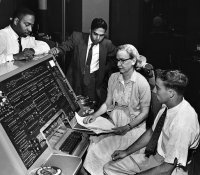Resources for Computer Science Education Week
This December 9-15 has been declared national Computer Science Education Week (CSEdWeek). The dates coincide with the birthday of renowned Admiral Grace Hopper, a pioneer in computer science. This initiative is a collaborative effort between members of Congress and Computing in the Core, a coalition of various organizations and corporations dedicated to bringing computer science education to the forefront. There are a number of events being held across the country to celebrate computer science education. These events are self-organizing, and there is a toolkit available to help you plan your participation.
This celebration of computer science education is not only a great way to build momentum around computer science in K-12 education, but it is also a great way to educate others about what "computer science" really means. Too often, classes that teach keyboarding or Microsoft Office are the only "computer science" courses offered, and many times schools assume that because students are using laptops or other technologies in their classrooms, that the school is teaching "computer science." This is a huge misconception.
According to the CSEdWeek site, computer science is:
- Computing
- Computer engineering
- Informatics
- Information technology
- Software engineering
- Information systems
These areas of study may look familiar in a specialized high school, but most K-12 institutions would not be able to define what that coursework might look like.
The beautiful thing is that knowing the details of the coursework is not always necessary in order to prepare young people for studying it. In a K-6 setting, teaching students how to input data into a spreadsheet and analyze it (a math skill!) can begin teaching them how computers are used to house, sort and analyze data in a database. By using the simple drag-and-drop programming software Scratch (a free download), students can learn basic programming language and computational thinking. Bringing robotics into the classroom or giving students time to tinker with tools like PicoBoards or MakeyMakeys will not only spark imagination and critical thinking, but will also give students a basic understanding of circuitry and the workings of simple machines that they use in their daily lives. In addition, for $35, schools can provide students with a Raspberry Pi, a computer the size of a credit card that can be turned into everything from a baby monitor to a pollutant sensor. If time and resources are the issue, teachers can plan a class trip to a local factory, industrial business or other technical workplace to see how computer science plays a part in industry. Can't leave the building? Bring in an industry expert via Skype or Google Hangout to share their story of how they got into the field of computer science and what their job entails.
CSEdWeek suggests that the most important components of computer science education, aside from the technical skills, are:
- Exposing students to critical thinking and problem solving
- Instilling understanding of computational thinking for success in the digital age
- Preparing students to attack the world's most challenging problems from a computation perspective
K-12 schools have the responsibility to prepare students for the future and the daunting task of helping decide what that future will hold. Creativity, innovation and global collaboration all lie in the field of computer science. How will your school celebrate Computer Science Education week?
